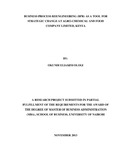| dc.description.abstract | Business process re-engineering as a tool for strategic change has been employed by many firms in management of their business processes. And it is against this backdrop that the study entitled “BPR as a tool for strategic change at Agro-Chemical and Food Company, Kenya” was conceived. Various aspects of strategic change and business process re-engineering were delved into and laid bare. Objectively, the study sought to determine the application and challenges encountered in applying business process re-engineering as a tool for strategic change at ACFC and the measures that the organization has put in place to mitigate the challenges. The research question was “How has BPR served as a tool for strategic change at Agro-Chemical and Food Company Limited, Kenya?” Both primary and secondary data which were qualitative in nature were collected and analyzed to determine the objectives of the study. Primary data was collected through administering of a set of questions to the senior management of ACFC by the use of interview guide, whereas, secondary data, was gathered by gleaning information from existing records in the company. Such documents included bulletins, service charters, strategic plans and the corporate website which were then analyzed using content analysis. The study established that business process re-engineering as a tool for strategic change has been in use at Agro-Chemical and Food Company and has fronted many benefits to the company in managing its business processes. Significantly, the areas were hiring and retention of workforce, purchasing and supplies issues, customer service, manufacturing processes optimization and project planning and management. However, these were not without a number of challenges which management instituted various measures to mitigate. The study’s major limitations were the inability to cover other general concepts of strategic change and BPR, the study being a case and so could not be used for generalizations in other companies and the fact that some respondents became stingy with information, citing reprisals from management as a result of divulging sensitive information. Nonetheless, it has formed a valid and reliable instrument for gauging the application and challenges of BPR as a tool for strategic change in the agro-processing industry in Kenya. And this could be instrumental to further studies which may seek to pursue related researches in other organizations and industries. | en |

